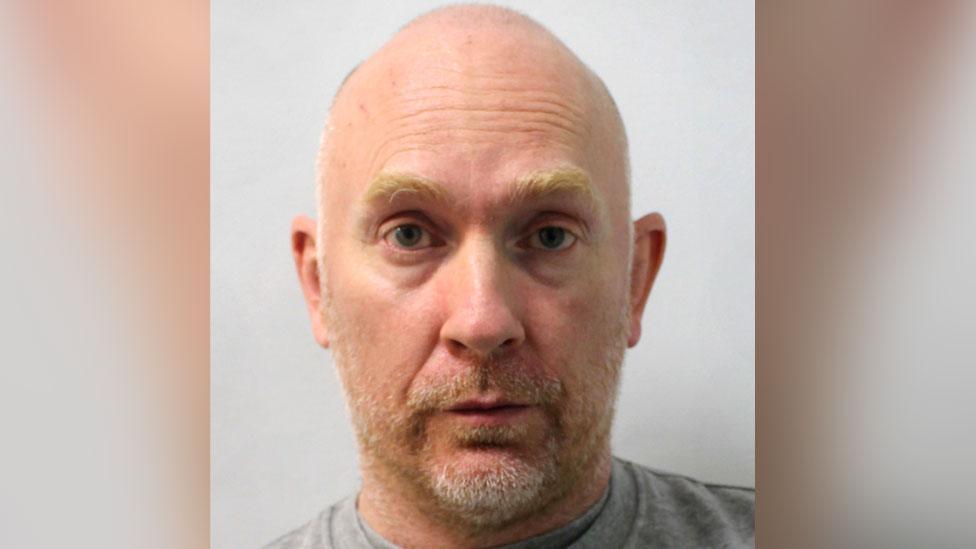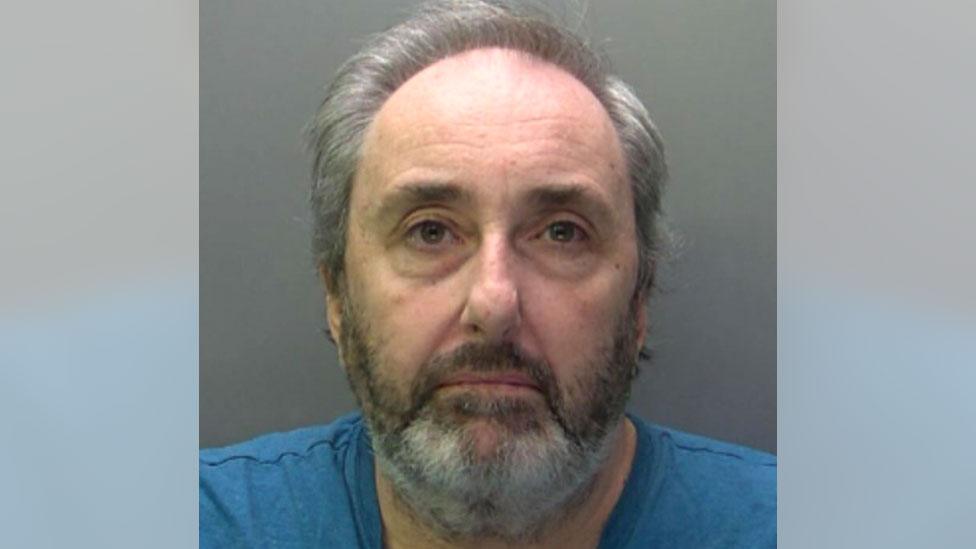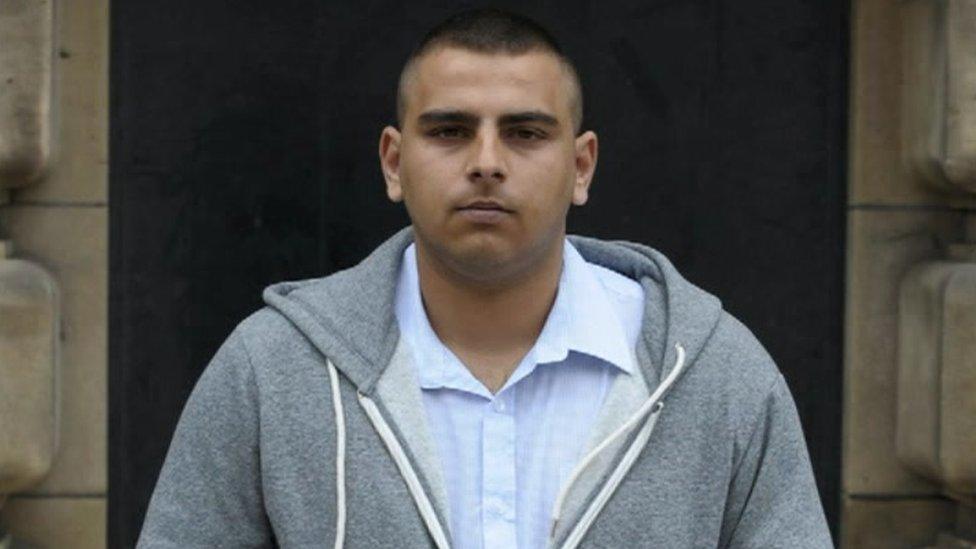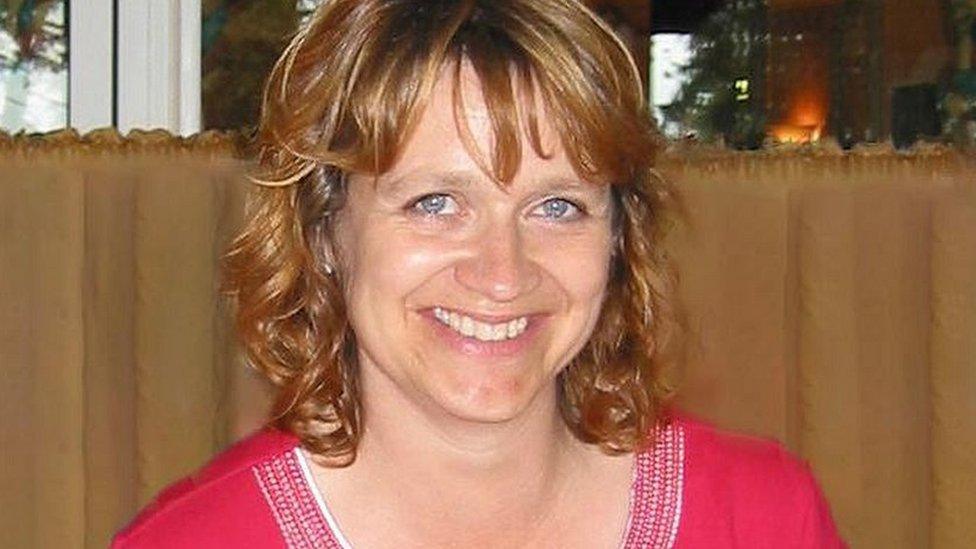Sarah Everard killer: Wayne Couzens appeals whole-life sentence
- Published

Wayne Couzens' lawyer said his remorse should have been taken into account in sentencing
The killer of Sarah Everard is challenging a sentencing order that said he should not be released from prison until he dies.
Wayne Couzens' appeal is part of a major review by the Court of Appeal of whole-life orders, including arguments for their wider use.
His lawyer said his remorse and guilty plea should be taken into account.
Lawyers for the Attorney General are also trying to increase sentences in two murder cases.
The lawyer for Couzens, Jim Sturman QC, said the former Metropolitan Police officer accepted his crimes were "abhorrent" and nothing in his arguments was intended to minimise the impact on his victim's friends and family, some of whom were present at the hearing.
But he said the sentencing judge's finding that he was not remorseful was "untenable".
"He was too ashamed to meet anyone's eye. He was not brazen, staring down at the court in the way sometimes seen," the lawyer said.
Mr Sturman said it was accepted that Couzens deserved "decades in jail" but his remorse and guilty plea should balance out the aggravating factor of having carried out the kidnap, rape and murder while he was a serving police officer.
There are 64 people currently in prison in England and Wales under whole-life orders, which are reserved for exceptional cases and mean they will never be released.
Couzens was the first person to be given such a term for a single murder of an adult not committed as part of a terror attack.
Mr Sturman said in written submissions: "Whilst this may well be considered by the public and the court to be a case of equal seriousness to a political, religious or ideological murder, it is not such an offence, not does it fall into any other category listed in the schedule."
Representing the Attorney General, Tom Little QC said Couzens' offending was of the "utmost seriousness" and his criminality was a "fundamental attack in reality on our democratic way of life".
He said the sentencing judge was entitled to the view that there was a "lack of general contrition" and a whole-life order was right in this "wholly exceptional case".
Couzens, who appeared at the hearing by video-link from prison, is one of two with whole-life terms involved in the Court of Appeal review, along with Ian Stewart, convicted of murdering his wife and later his fiancee.

Ian Stewart, convicted of murdering his wife and fiancee six years apart, is also appealing his whole-life order
Earlier this year, Stewart was handed a whole-life term for the 2010 murder of his first wife Diane. Previously, in 2017, he was sentenced to life in prison with a minimum term of 34 years for the murder of his fiancee, children's book author Helen Bailey.
His barrister, Amjad Malik QC, said a whole-life sentence was not justified, adding that the aggravating features of the killings did not fall into the category of "an exceptionally high-seriousness case".
Many serial killers have received whole-life orders but this was not such a case, he argued.
However, Mr Little said: "It is difficult to say that this sentence was either manifestly excessive or wrong in principle."


Today's super-appeal is the second time in a decade that top judges in England and Wales have considered the law and practice of whole-life terms, after ruling in 2012 that they were compatible with human rights safeguards.
Today's cases concern which offenders should be eligible for the sentence outside the basic rules set by Parliament.
Wayne Couzens' murder of Sarah Everard was an exceptional case for a whole-life order because it was a single killing - but the judge said his betrayal of uniform and duty undermined trust in society itself.
The Emma Tustin case is more complex. Her lawyers argued that the killer's own mental ill health and experience as a victim were factors that counted against a whole-life term.
The panel will now wrestle with these complex and tragic cases before potentially coming up with some guiding principles. But it's already clear where the judiciary stand in general - on average, they've imposed far more whole-life orders since taking over the job from ministers some 20 years ago.

Three more sentences are also being considered by the judges:
Emma Tustin is challenging her sentence of at least 29 years for the murder of Arthur Labinjo-Hughes, while the Attorney General is arguing it was too lenient.
Thomas Hughes is having his sentence of at least 21 years for Arthur's manslaughter reviewed.
The Attorney General is also appealing against the 40-year minimum sentence given to Jordan Monaghan, who killed two of his children and his partner.
Tom Little QC, for the Attorney General, said Tustin's case "merited at the very least consideration of a whole-life order".
He said Arthur was "forced to live a solitary and lonely life" and "subjected to the most unimaginable suffering".
In written submissions, he said the murder was "sadistically motivated", with "systematic brutality amounting to torture".

The sentences of Emma Tustin and Thomas Hughes for the killing of Arthur Labinjo-Hughes are also being reviewed
Tustin's lawyer, Mary Prior QC, said the sentence was given by a highly experienced trial judge after considering all the evidence.
He concluded the starting point should be 30 years because of the sadistic elements of the killing, and then took into account the murderer's background of growing up around violence, history of mental health issues and suicide attempts, she said.
Ms Prior said: "This was the right, fair and proper approach in this very difficult and exceptional case."
In the case of Monaghan - who at the age of 30 was given a 40-year term for killing his baby daughter, toddler son and a new partner, as well as attempting to kill another child - Mr Little said the sentence was "unduly lenient".

There was "no mitigation at all" for triple-murderer Jordan Monaghan, the court heard
His crimes, over a seven-year period, were of "exceptionally high" seriousness and there was "no mitigation here at all", the lawyer for the Crown said.
Benjamin Myers QC, representing the killer as he listened in from HMP Wakefield, said the decision not to impose a whole-life order was at the discretion of the sentencing judge.
The hearing into all five sentences, at the Royal Courts of Justice, has now concluded and a decision will come in writing at a later date.
The Lord Chief Justice Lord Burnett said: "We propose to take time to consider our decisions in these very difficult and tragic cases."
- Published30 September 2021

- Published9 February 2022

- Published31 December 2021

- Published17 December 2021
